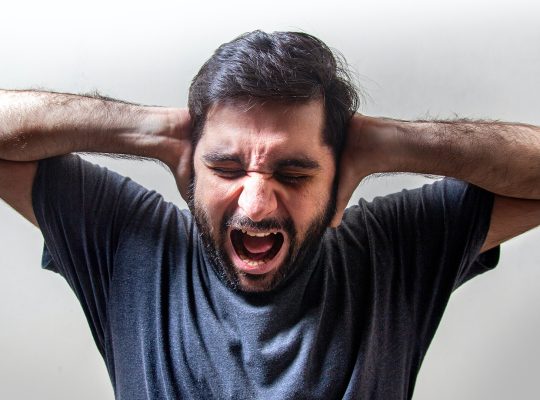Imagine this: you wake up, turn your head, and suddenly you can barely hear anything on one side. Or you’re at work, someone says something, and it arrives as muffled humming. Sudden hearing loss – also known as sudden deafness – is not an everyday occurrence, but when it does happen, it can be quite frightening. What is going on? And more importantly, should you panic right away?
In this blog, we’ll take you through the possible causes of sudden hearing loss, what to do if you experience it and when it’s smart to raise the alarm right away.
What is sudden hearing loss anyway?
Sudden hearing loss (in medical terms, sudden sensorineural hearing loss) means that your hearing deteriorates significantly in a short period of time – often in one ear. This is not a small difference, but really a noticeable loss: as if someone suddenly turned down a volume knob or your ear were clogged with cotton wool.
Sometimes it happens within a few minutes, sometimes over a few hours or a day. Often for no apparent reason. And sometimes the hearing returns spontaneously, but unfortunately that is no guarantee. That is why it is important to know what the possible causes are.
Common causes of sudden hearing loss
1. Earwax plug (conductive loss).
We’ll start with the most innocent cause: a blockage in the ear canal. A thick plug of earwax can suddenly shift or swell as a result of showering, swimming or picking yourself up, for example. Result: sound no longer comes through properly, and you suddenly hear much less.
Good news: this is easy to fix. Often blowing out or cleaning at your doctor’s office is enough. Or you can use a safe home ear cleaner, such as the Bebird with camera – then you can see for yourself if there really is a plug and gently remove it.
2. Noise trauma
Did you just attend a concert, party or festival? Or did you wake up next to someone who snored heavily at 120 decibels? If so, your inner ear may have become temporarily overloaded. Sometimes this is temporary (for example, if you have a squeak or dullness after loud music), but with really loud bangs – such as fireworks or a gunshot – permanent damage can occur.
Use hearing protection in noisy situations because you can often prevent this type of hearing damage.
3. Infections
A middle ear infection or viral infection (such as a cold, flu or even the herpes virus) can affect your hearing. In children, this is common with ear infections, but adults can also experience it.
Sometimes fluid accumulation in the middle ear causes temporary hearing loss, sometimes the virus damages the nerve pathways leading to your brain. Especially if you have pain, fever or dizziness, it is a good idea to contact your doctor.
4. Sudden sensorineural hearing loss (SSNHL).
This is the medical term for hearing loss that occurs without obvious cause and is almost immediately noticeable. Often only one ear is affected. The exact cause is often unknown, but is thought to be:
- Virus infections
- Problems with the blood supply to the inner ear
- Autoimmune reactions
- Sometimes stress or extreme fatigue
SSNHL is an emergency: if you are treated with corticosteroids (anti-inflammatories) within 72 hours, the chances of recovery are much higher. So: don’t wait, call your doctor or the doctor’s office immediately.
5. Ménière or balance disorders
Ménière’s disease involves an attack of dizziness, tinnitus and hearing loss – often in waves. Other balance disorders can also cause sudden hearing loss, especially if the pressure in the inner ear changes.
In addition to hearing loss, do you feel like you can’t walk straight, are dizzy or get nauseous? If so, there may be more to it. Always get it checked out.
6. Medication (ototoxic agents).
Some medications – such as certain antibiotics, chemotherapy or heavy painkillers – can affect hearing. In rare cases, this happens acutely. If you have just started taking a new medication and notice a sudden deterioration in your hearing, consult with your doctor or pharmacist.
7. Stress and tension
It may sound vague, but chronic stress can affect the blood flow in your body – including your ears. Some people experience a temporary wheeze or even hearing loss during a period of high stress. This is usually reversible, but it is a signal that your body is putting on the brakes for a while.
What should you do in case of sudden hearing loss?
Don’t wait. The chance of recovery is greatest if you get medical attention within 24 to 72 hours – especially with SSNHL. So go to your doctor or doctor’s office right away. Get your hearing tested. If necessary, through an audiologist (Last? Contact us now!) who can do a quick measurement.
If it turns out to be a blockage, it is relatively easy to fix. If it involves something in the inner ear, treatment with medication is often necessary.
What can you do (and not do) yourself?
- Don’t wait. No “hold off until Monday. Better to see the doctor once too often than too late.
- Do not use cotton swabs. By doing so, you actually push earwax further into the ear, with a greater risk of damage.
- Do not use water or oil if you are not sure what is going on. With a hole in the eardrum, this can cause damage.
- Rest and relaxation. Give your body a chance to recover, especially with infection or stress-related hearing loss.
In conclusion
Sudden hearing loss is scary, but it doesn’t have to be permanent right away. Your hearing is vulnerable, but also resilient – provided you take action in time.
Do your ears bother you regularly or want to be able to see for yourself if there’s a plug? Then consider a Bebird with camera – with it you can safely and precisely see what’s going on, and possibly clean it without risk.
And don’t have hearing protection in your home yet? Don’t wait until it’s too late. Because hearing, that’s what you want to be able to keep doing. Every single day.









